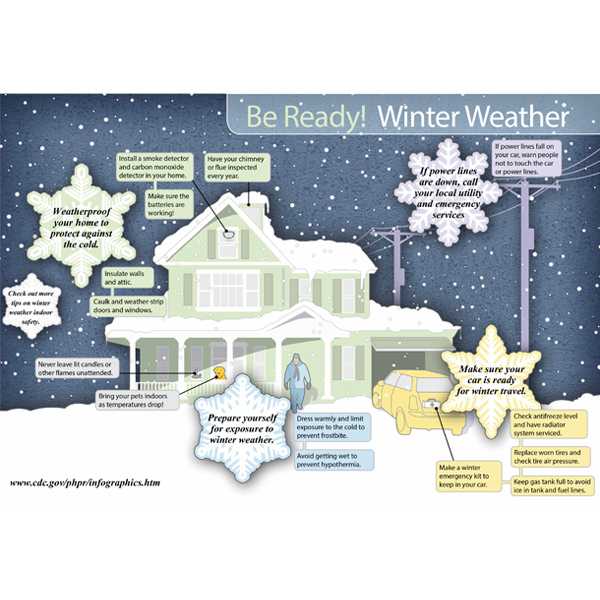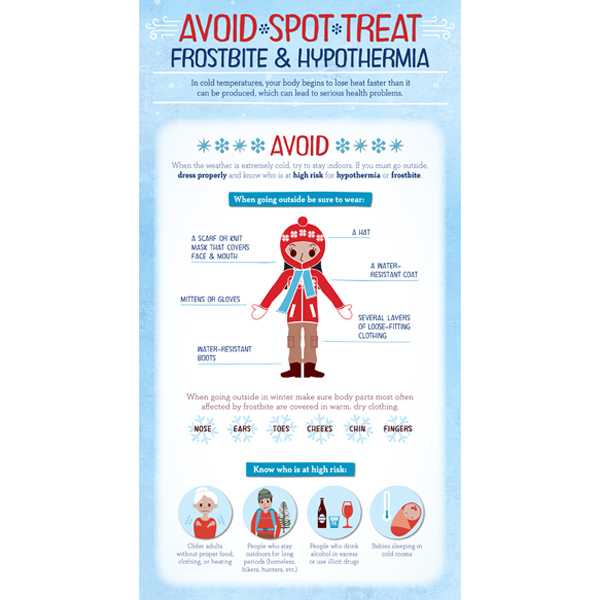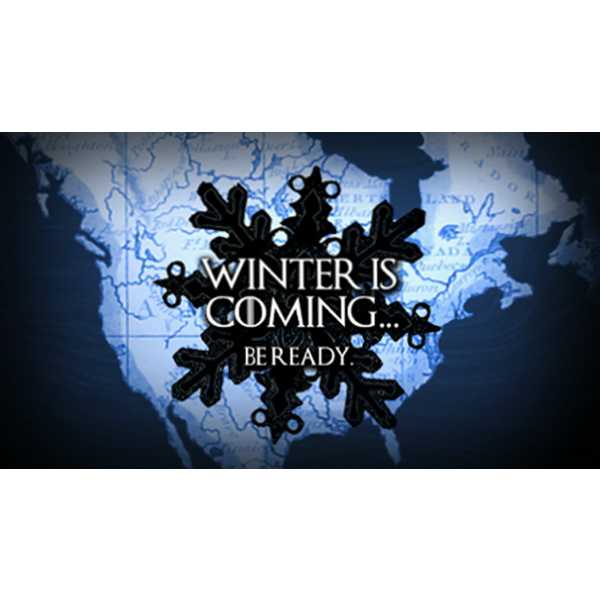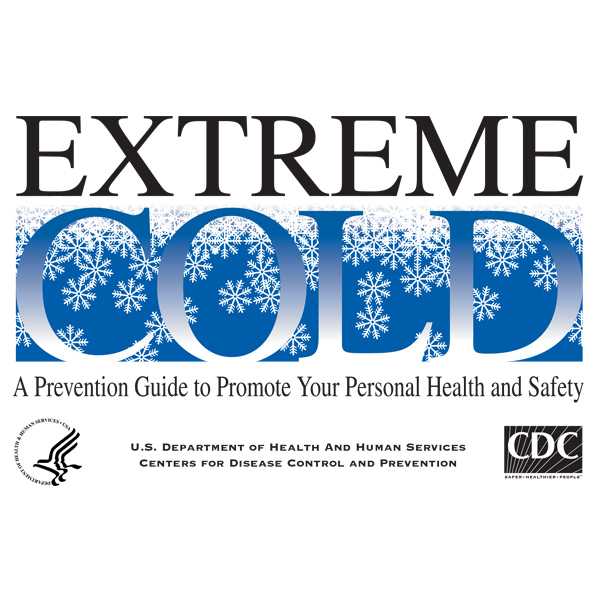Protect Yourself from the Dangers of Winter Weather
Are You Prepared for Winter Weather?
When winter temperatures drop significantly below normal, staying warm and safe can become a challenge. According to a 2014 CDC National Health Statistics Report, during 2006–2010, about 6,600 U.S. residents died from exposure to excessive natural cold, hypothermia, or both.
What is extremely cold weather? The definition of extreme cold can vary. After all, what is cold to one person may not feel that cold to another. People who live in regions with relatively few days of freezing temperatures are not accustomed to them when they go to colder areas.
Whenever temperatures drop below what feels lower than normal to you—and as wind speed increases—heat can leave your body more rapidly and leave you at risk of health problems.
Extremely cold temperatures are often accompanied by winter storms, so in addition to the risks of the cold, you may also have to cope with power failures and icy roads. Staying indoors as much as possible can reduce the risks of car crashes and falls on the ice, but you may also face indoor hazards. Many homes will be too cold—either due to a power failure or because the heating system isn’t adequate for the weather. When people must use space heaters and fireplaces to stay warm, the risk of household fires increases, as well as the risk of carbon monoxide (CO) poisoning.
If you are prepared for the hazards of winter, you will be more likely to stay safe and healthy when temperatures start to fall.
- Winterize your home. Install weather stripping, insulation, and storm windows.
- Get your car ready for cold weather. Service the radiator and maintain antifreeze level; check tire tread or, if necessary, replace tires with all-weather or snow tires. Keep an emergency kit in your car including blankets, food and water, first aid, and other items you may need if you are stranded
- Be prepared for weather-related emergencies, including power outages.
- Prevent CO poisoning. Install a CO detector and check that it has a working battery. Have your heating system checked by a qualified professional. Never use a gas range or oven to heat your home.
- Take precaution when spending time outdoors. Wear appropriate outdoor clothing and be aware of the wind chill factor. Check weather reports, telling someone where you are going to be (if long drive or ice fishing). Always have a fully charged cellphone and carry a portable recharger, if possible
- Be aware of current and forecast weather conditions when planning for travel.
- Learn how to avoid, spot and treat frostbite and hypothermia.
- If you have pets, bring them inside. If you cannot bring them inside, provide adequate, warm shelter and unfrozen water to drink.
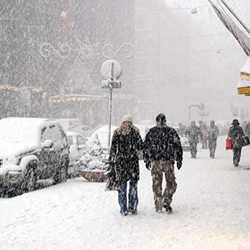
Contact Information
NCEH/ATSDR Office of Communication
(770) 488-0700
envhealthmedia@cdc.gov
Spokesperson
Amy Wolkin, DrPH

"Winter storms and cold temperatures can be hazardous, but if you plan ahead, you can stay safe and healthy. Prepare your home and cars. Prepare for power outages and outdoor activity."
Amy Wolkin, DrPH - Branch Chief, Health Studies Branch, National Center for Environmental Health
Related Links
- Most Relevant
- CDC Related Links
- Additional Resources
- Multimedia ( e.g. podcasts, videos)
- Social Media
Before:
#Winter storms in the forecast? Plan ahead! Get to your destination before the storm hits or adjust your plans. http://1.usa.gov/1OwUj5J
Winterize your car & make sure you have emergency supplies in the trunk. http://1.usa.gov/1KuWAui #winter
Prevent frozen pipes! Open cabinets to let warm air circulate and let water drip from the faucet. http://1.usa.gov/23jRz3a #winter
Are you ready for a #winter storm? Make sure to heat your home safely using this quick checklist: http://1.usa.gov/1KuWAui
#Winter weather can knock out power lines. Keep flashlights handy & be ready. http://1.usa.gov/1KuWAui
Grab the #winter weather widget to share @CDCgov health and safety information from your website. http://1.usa.gov/1SB5xLw
Make sure you're ready for power outages, cold temps, & bad roads. Learn how to stay safe: http://1.usa.gov/1UqeEiq #winter
During:
Visit our #winter weather FAQs to learn about hypothermia, frostbite, wind chill, and more. http://1.usa.gov/1PMrlfD
Hazardous road conditions due to #snow. Stay on main roads & drive slow... or bundle up & stay home! http://1.usa.gov/1OwUj5J
#Winter safety tip: Follow directions from local officials. If advised to stay off the roads, don't travel unless absolutely necessary. http://1.usa.gov/1OwUj5J
Stranded in your car? Staying in your vehicle is the safest choice. Follow these tips if you get stuck: http://1.usa.gov/1OwUj5J
Check occasionally to make sure that snow isn't building up around your car's tail pipe to avoid #COpoisoning. http://1.usa.gov/1UHo5Iz
Pets get cold, too! Keep your furry friends inside to protect them from #winterweather & follow these tips from @ASPCA: http://bit.ly/215dxEJ
Don't slip and fall this #winter, make sure you have rock salt and sand so you can get around in slippery conditions. http://1.usa.gov/1OwUj5J
After:
Returning home after a #winter storm? Follow these tips to stay safe during cleanup: http://1.usa.gov/22TG3Zj
When removing debris after a winter storm or flood, be safe with #chainsaws. Follow the manual & wear protective gear: http://1.usa.gov/1rqva5Y
After a #winter storm, throw out foods that may not be safe. When in doubt, throw it out! http://1.usa.gov/214wHdR
Hand washing is part of disaster cleanup, too. Wash hands before handling food & whenever you stop working. http://1.usa.gov/2484aWw
Keep your family safe from #COpoisoning after a winter storm. Learn how: http://1.usa.gov/1UHo5Iz
- Page last reviewed: November 24, 2015
- Page last updated: November 25, 2015
- Content source:


 ShareCompartir
ShareCompartir
